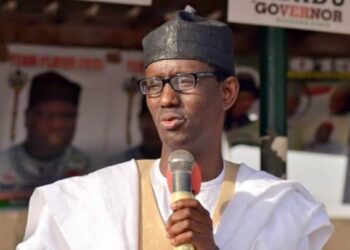…Ready to sacrifice presidential ambition
Former Vice President and chieftain of the ruling All Progressives Congress (APC), Alhaji Atiku Abubakar, yesterday declared that lazy northerners were the ones afraid of the much- talked about restructuring of the county, adding that if his posture on restructuring will cost him his political career, so be it.
His position was being reiterated 24 hours after another APC chieftain, Asiwaju Bola Ahmed Tinubu, also lent his voice to the restructuring of the country.
The Wazirin Adamawa, who has been in the forefront calling for re-arrangement of Nigeria’s co-existence, explained that he came out to advocate for restructuring even when some people think he was doing it at the detriment of his political career, saying, “I still stand by it.”
Atiku, who delivered a keynote address at a youth forum, organised by Coalition of Civil Society Groups under the auspices of Play Forum at the weekend in Abuja, blamed the current political structure on the military government’s failing to implement the Constitutional Conference of 1994/1995 recommendation of a single term of six years for the President to rotate among all the six geo-political zones.
“So, I don’t know what those who are against restructuring are afraid of. Those afraid must be lazy. We fought the civil war with the Igbos. Today, the Igbos have been completely rebuilt, but we still find mud houses in the north. Is it the fault of the easterners that the north is like that?” he asked rather rhetorically.
“So, there are more fundamental issues that we need to deal with after which we would have settled on what basis we want our federation to be. How do we draw the boundary because even the Ijaws are not contiguous to each other? I come from a state where we are minorities. In Adamawa, whether you are Hausa, Fulani, Christian or Muslim, you are from the minority. It is the same thing in Taraba.
“I think that what is most important is the devolution of powers and resources with the various governments whether states or regions. How do the people hold those in power accountable for the resources handed over to them?
“We are not as educated as we are today in the first republic, yet it beats my imagination how those in charge of the local governments were more efficient, honest and transparent in accountable administration.”
While assuring that he would no longer be in politics in the next 10 years, Atiku explained that: “There is this impression about disconnect between the youths and the older generation. But I don’t think it is quite correct because the age range of local government elected councillors, chairmen and state National Assembly members is within the bracket of the youths. So, the disconnect is not such that it is total. There is a continuation and a phase-out. I don’t expect to be in politics in the next 10 years, absolutely not.”
Continuing, the former number two man said, “I want to agree essentially that there is every need for us to sit down and talk about our future,” adding, “this is because the arrangements in the last 50 years or so have not served us very well.
“I am not a product of the current structure of Nigeria. I am a product of regional government. I saw the government at work and I have also seen the current arrangement at work.
“That was why I came out, some people even said to the detriment of my political career, to advocate for restructuring or rearrangement or whatever you call it of the present structure of the country. I still stand by it. But we cannot determine the nitty-gritty of this restructuring until we are able to dialogue and agree on how we want to continue to live together as a country.
“It is good that all the representatives of the ethnic groups agreed that we should continue to live together, I believe it is imperative. But I also don’t believe in the current arrangement which I have always referred to as unitary federalism which was a creation of a prolonged military rule.
“It all started after the civil war, when General Murtala Mohammed set up the Constituent Assembly of 1978 and specifically instructed the Assembly to recommend a very strong federal government which no component can challenge or try to secede.
“He was understandably coming from the perception of Biafra civil war. He felt that the war was caused by the region which felt that it was too independent to pull out of the country. Subsequently, they kept amending the constitution centralising more and more power at the centre,” he further canvassed.



